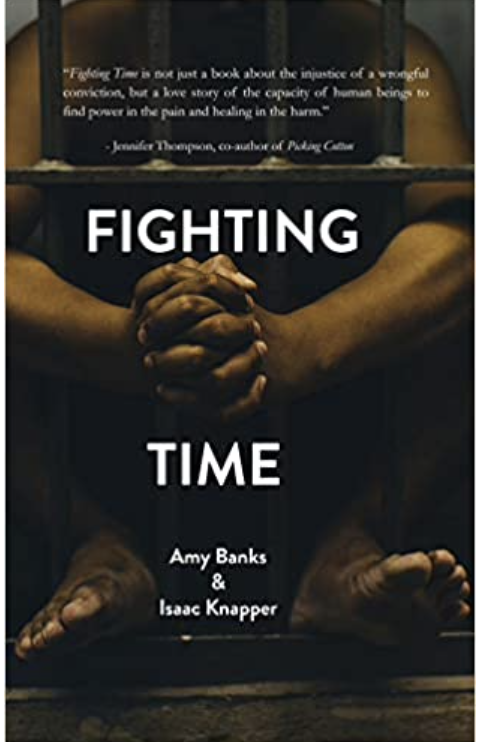Fighting Time by Isaac Knapper and Dr. Amy Banks tells the story of two families who connected through a traumatic, horrific moment. Both spoke at Fieldston last Thursday.
Isaac Knapper is head trainer of the Crescent City Boxing Gym in his hometown New Orleans. Dr. Amy Banks, sister to Nancy Banks (history teacher at Fieldston), is a psychiatrist, speaker, author, and educator dedicated to the neurobiology of relationships. Banks was just sixteen years old when her father, Dr. Ronald Banks professor at the University of Maine, was murdered during an attempted robbery inches from the safety of his hotel in New Orleans, Lousiana. When the crime took place Isaac Knapper was with family at home in a nearby housing project. Days later he was arrested, tried as an adult at just sixteen years old, and wrongly convicted of Dr. Ronald Banks’s murder. When white prosecutors informed the Bank’s family that they had caught the man who murdered their father they believed justice had been done. Knapper was sentenced to life in prison without parole and sent to one of the most dangerous prisons in America: Louisiana State Penitentiary. Knapper was just two votes off from being sentenced to death row for a crime he did not commit.
This past summer Fieldston students were required to read the memoir Just Mercy by Bryan Stevenson. The book tells the story of the EJI (Equal Justice Initiative) and one of its first clients: Walter McMillian a young black man who was sentenced to death row for the murder of a young white woman a crime that he did not commit. In November, Anthony Ray Hinton a black man who was sentenced to death row in the same facility as Walter McMillian, addressed the Fieldston community about his story and the 30 years he spent on death row for a crime he did not commit. To continue this conversation of wrongful conviction, police brutality, and mass incarceration students were encouraged to attend at least one of the discussions held this past Thursday to hear Dr. Amy Banks and Mr. Knapper’s story. Classes whose curriculum fit the discussion attended D and E band sessions to hear the authors speak. Additional sessions were held during the upper form lunch periods.
In these discussions students heard first each author’s “story” then the floor was opened to questions. One student asked “How did you two finally come together?” In 1992 Knapper’s conviction was overturned when a police document was found that contained exculpatory evidence that was kept from Knapper’s defense team at the time of the trial. For those who read Just Mercy over the summer this was also the case in McMillian’s story. It wasn’t until 2004 that the Bank’s family found out that his conviction had been overturned. Dr. Amy Banks said “We were horrified that a young boy was wrongfully convicted for our tragedy.” In 2015, haunted by this fact she realized it was “time to unpack her own family trauma.” She reached out to Lory White, Mr. Knapper’s lawyer, and set up a time to meet him in New Orleans. Since then, especially during the writing process of their book, both Knapper and Banks have spent plenty of time with each other. Knapper described talking with Banks as “therapy,” and that “speaking with y’all today is like therapy.”
Another question asked was “What do you wish you knew about your race at 17?” Dr. Banks discussed growing up that “I wish I was taught more gory details, not just white history. You don’t have to be a flagrant white supremacist to be racist. You just have to grow up in America.” She talked about how everyone is born with a “package of privilege” depending on the color of their skin “if you are born this color then this will be easier for you.” Knapper discussed how race is like a 100 yard dash: “White people are lined up 10 yards from the finish line and black people and everyone else are still at the starting line” He continued saying that growing up everyone with power was white, so when a crime took place “they would go straight to the projects.”
Mr. Knapper, as head trainer at the Crescent City Boxing Gym, is dedicated to helping kids avoid the suffering he experienced in the Louisiana Department of Corrections. He mentors young boxers to help keep them off the streets and away from any violence.
Dr. Amy Banks has published other works including Wired to Connect, Four Ways to Click, and The Complete Guide to Mental Health for Women. She is also the creator of the C.A.R.E Program, a guide that helps clinicians understand their relationships and build their neural pathways for connection.
The authors both agree that “we need to step out and start talking about these things.” The trauma they share is something that they will “never heal from.” The American legal system has let them both down in life-changing ways and their story is just one of many. To further the discussion about wrongful convictions a great place to start is visiting the EJI’s website. Along with this the Tate library has several of these works in the collection, including Fighting Time and The Sun Does Shine by Anthony Ray Hinton.







This is such an insightful article! Love your writing <3